 Euro 2024 reverted to a single host, Germany, after the pan-European 2020 version (that was actually held in 2021). That looks like it will be a one-off with the UK & Ireland due to host next and then Turkey and Italy in 2032.
Euro 2024 reverted to a single host, Germany, after the pan-European 2020 version (that was actually held in 2021). That looks like it will be a one-off with the UK & Ireland due to host next and then Turkey and Italy in 2032.
Taking place across ten cities and ten stadiums in Germany the tournament was a success. Germany looked like they were going to go all the way, setting a statement when they beat Scotland in the opening match. They ended up on the wrong side of the draw, though, despite winning their group and came up against Spain in the quarters – frankly the only team that were going to beat them and they did 2-1 after extra time. That ended up being the only game that Spain failed to win in 90 minutes.
Spain were imperious scoring 15 goals (a record) from ten different players (a record) with the youngest ever appearance maker and the youngest ever goal scorer (Lamine Yamal – just 16 years old). They met England in the final, their second in succession, but in reality England got there because they had an easy group and relatively easy knockout games. Spain didn’t blow England away in the final, winning 2-1, but there only looked like one team who was going to win it. England’s wait goes on, so close but in so many ways still so far.
There were less goals this time, 117 vs 142 at Euro 2020, but at the same time 29 of the 51 games saw both teams score in what was an exciting tournament. As well as seeing the youngest ever player and goalscorer we also saw the oldest player (Pepe for Portugal at 41) and the oldest goalscorer (Luka Modrić for Croatia at 38). The Czech Republic v Turkey game saw a record 19 cards, 17 yellows and 2 reds, in a tournament that saw 4.7 cards per game on average.
The Golden Boot was shared between six players all with 3 goals, including Harry Kane – with UEFA deciding to share the price this time rather than allocate it based on assists and minutes played as they usually do when it is tied. The fastest goal ever was also scored by Nedim Bajrami for Albania in just 23 seconds against Italy.
Have a look below if you want to refresh yourself on the stadiums used and the fixtures.
Euro 2024 Stadiums
| Stadium | Matches | Group | Highest Stage | Capacity |
|---|---|---|---|---|
| Allianz Arena | 6 | A, C & E | Semi-Final | 75024 |
| Deutsche Bank Park | 5 | A, C & E | Round Of 16 | 58000 |
| Merkur Spiel-Arena | 5 | B, D & E | Quarter-Final | 54600 |
| MHPArena (Stuttgart) | 5 | A, C & E | Quarter-Final | 60058 |
| Olympiastadion Berlin | 6 | B & D | Final | 74475 |
| Red Bull Arena (Leipzig) | 4 | B, D & F | Round Of 16 | 47069 |
| RheinEnergieStadion | 5 | A, C & E | Round Of 16 | 50000 |
| Signal Iduna Park | 6 | B, D & F | Semi-Final | 81365 |
| Veltins-Arena | 4 | B, C & F | Round Of 16 | 62271 |
| Volksparkstadion | 5 | B, D & F | Quarter-Final | 57000 |
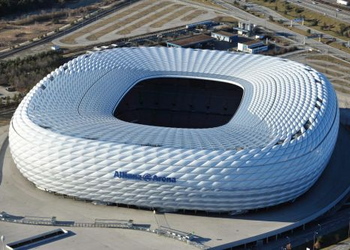
That wasn’t the only reason, of course, with the country’s lack of a decent transport infrastructure and limited hotel capacity within host cities being pointed out by UEFA’s report. Yet there’s also little question that UEFA will have been keen to avoid any conversations about the human rights issue after such controversy was stirred up when Qatar won the vote to become a World Cup host. Not that the Turkish newspapers took the decision lightly, suggesting that UEFA had ‘given its support to racism’, which was a reference to the accusations of racism within the German national side levelled by the Turkish-born midfielder Mesut Özil. The decision has been made, however, so what can we tell you about the stadiums that are the most likely to be used for the tournament when it rolls around in 2024?
Stadium Details
Having seen FIFA need to invest millions in order to allow football to be played in a country like Qatar, where temperatures can reach up to forty-five degrees Celsius, it’s perhaps somewhat unsurprising that UEFA have chosen a host nation that already has a decent footballing infrastructure. Whole cities needed to be built to make Qatar a viable place to watch the World Cup, let alone the stadia where the tournament’s matches will actually take place. The same is obviously not true of Germany, where the Bundesliga is one of the most attended football leagues in the world and countless top-quality venues are already in existence.
Again, that’s part of the reason why UEFA went with Germany over Turkey when they were making their selection of the country best placed to host the Euros in 2024. The German football association see it as an opportunity to further the sport in general in the country, with the President of the DfB, Reinhard Grindel, citing what a difference it will make ‘for grassroots football [and] for our 25,000 or so amateur teams’. Not that all of the other European countries were overly impressed with the decision, given that Germany hosted the World Cup in 1974 and 2006 as well as the Euros in West Germany in 1988, while England has still only been the national host for one World Cup back in 1966.
Even so, it is undoubtedly the brilliant facilities available in Germany that helped to sway the voting panel. Eighteen cities put themselves forward to host matches, with that number being whittled down to fifteen by the time the deadline to do so arrived in April of 2016. Only two cities, Freiburg im Breisgau and Karlsruhe, suggested needing to build new stadia in order to be considered for the bid, which shows the strength of German football. In the end, the bid team reduced the candidate venues down to the ten required, none of which were located in Freiburg im Breisgau or Karlsruhe. The German bid had the motto, “United by Football – Vereint im Herzen Europas”, which translates as ‘United by Football – United in the Heart of Europe’ and tells you everything you need to know about the stadiums selected and the bid itself.
OLYMPIASTADION – Berlin
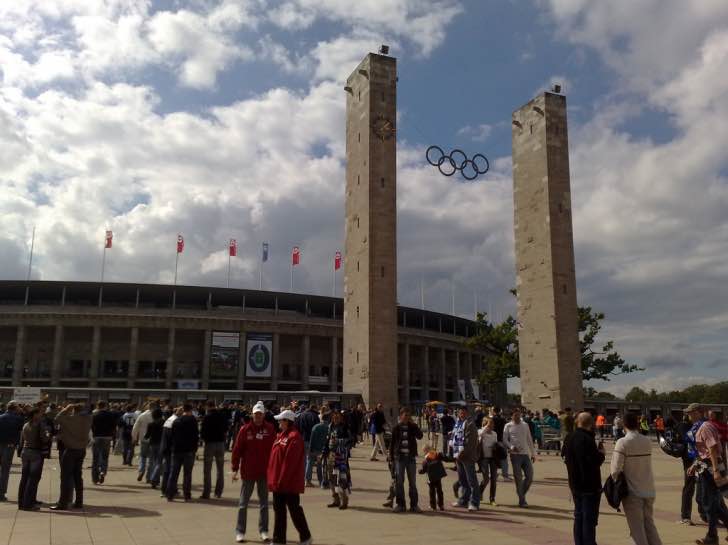
74,475
The name of the main stadium in Berlin tells you everything you need to know about it, with the venue having been constructed to host the Olympic Games back in 1936. Now part of Berlin’s Olympiapark, the stadium underwent significant renovations in 2004 ahead of being one of the host venues for the 2006 World Cup. Whilst it was initially intended to be used as an athletics venue, it has known about the trials and tribulations of hosting football matches on a regular basis since Hertha BSC began to call it home in 1963. A Category Four venue, the Olympic Stadium has hosted numerous high profile games over the years. As well as three matches during the World Cup in 1974 and six games including the final during the same competition in 2006, it was also the location for the Champions League final in 2015.
The FIFA Women’s World Cup used the Olympiastadion in 2011 and the German Cup final takes place at the ground every year, so there’s no question of the stadium struggling to cope with the influx of crowds expected in 2024. The stadium is rarely sold out for Hertha’s home games and the club is hugely accommodating, so if you want to get a taste of what to expect before the World Cup itself then it might be worth getting along to watch Die Alte Dame ply their trade in the domestic tournaments at some point. When the stadium was renovated ahead of the 2006 World Cup the entire lower tier was rebuilt, aiming to give it a more intimate feel. That there’s still a running track and it is a multi-purpose venue means that this wasn’t exactly mission accomplished, but it’s still a spectacular location to watch big games.
ALLIANZ ARENA – Munich
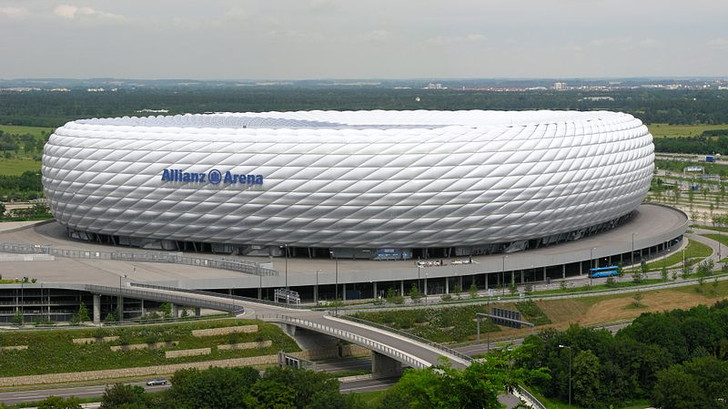
€340 million
Despite the fact that the Allianz Arena will be nearly twenty years old by the time the European Championships get underway in 2024, it is still seen as an excellent example of what a modern football stadium can look like. It boasts an exterior that is made of inflated ETFE plastic panels that can change colour, meaning that it’s the ideal venue for a competition that will have different teams playing in it every few days. That might have earned it the nickname of ‘Schlauchboot’, or ‘inflatable boat’, but it’s also made it popular with football fans from Germany and beyond. The home of Bayern Munich and sometimes the German national side, the Allianz Arena also hosted 1860 Munich from its opening in 2005 until 2017.
One of the big things to watch our for is the official name that the venue is given during the Euros. UEFA’s rules on sponsorship match those of FIFA; namely that only official partners are allowed to have their brands mentioned during the competition. As a result, the Allianz became the FIFA WM-Stadion München during the 2006 World Cup and the Fußball Arena München during Nations League games. In terms of the transport links that UEFA criticised Turkey for, the Allianz Arena offers the largest parking structure in Europe as well as the Fröttmaning U-Bahn U-Bahn station right next door to it. It truly is a wonderful venue in which to see football being played, though that is only true after FC Bayern Munich club members informed the German side that there was a draft inside that made it uncomfortable to watch matches there, leading to them installing closable doors.
WESTFALENSTADION (Signal Iduna Park) – Dortmund
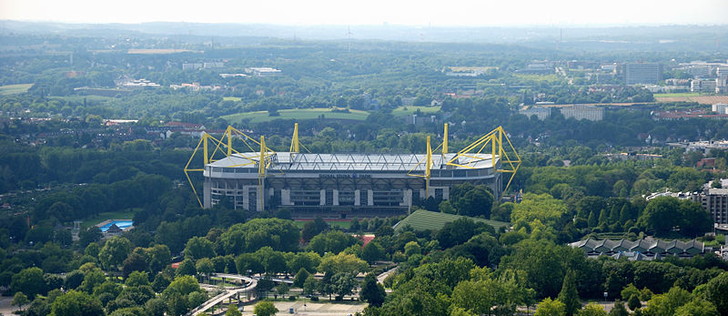
€200 million
Despite the fact that there are hundreds of thousands of football stadiums around the world, few can claim to be truly iconic. Anfield, Wembley and Old Trafford perhaps tick the box in the UK, with the latter two because of their size and the former because of the world-famous Kop. The Westfalenstadion in Dortmund finds itself on the list for both reasons, having the ability to welcome more than eighty thousand supporters due to the Südtribüne. That is the largest area for football supporters to stand in Europe, with just shy of twenty-five people able to stand on it. Sadly they don’t get to do so during UEFA matches, with the ground’s capacity reduced to just in excess of sixty-five thousand in Champions League games because of the governing body’s rules on standing. It has been used as a venue for countless big tournaments including all of Germany’s World Cup hosting duties as we as the 2001 UEFA Cup final.
The home of Borussia Dortmund is officially known as Signal Iduna Park because of sponsorship, resulting in it being known by numerous other names over the years because of UEFA and FIFA’s rules on sponsorship mentioned when discussing the Allianz Arena. In 2006 it became the FIFA World Cup Stadium Dortmund, whilst during Champions League games it is referred to as BVB Stadion Dortmund. When the Südtribüne is in full flow during Dortmund home matches it is given the nickname ‘the yellow wall’, such is the extent to which you can barely see anything except flags and tops in the club colours. Quite what UEFA will decide to do regarding which nation gets to locate its fans in there during the Euros remains to be seen, but they’ll find themselves in one of the most iconic stands in football.
ARENA AUFSCHALKE (VELTINS-ARENA) – Gelsenkirchen
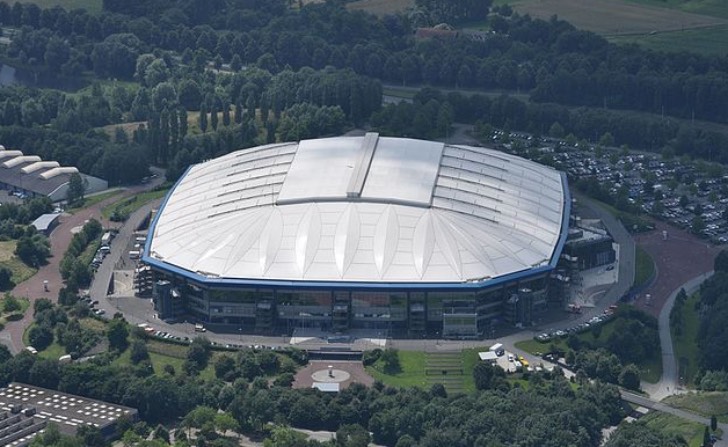
62,271 / 54,740
€191 million
FC Schalke 04
Known as Veltins-Arena because of sponsorship, the venue boasted the more unexciting name of Arena AufSchalke during its first four years of existence. That’s also the name that it returns to when it’s used to host any matches other than the domestic games of of its resident club, FC Schalke 04. Example matches when that’s been the case include the 2004 Champions League final and five games during the 2006 World Cup, including the quarter-final matchup between England and Portugal. As with the Westfalenstadion, the ground has two different capacities depending on whether or not the supporters within the venue are allowed to stand during the matches that they’re watching.
The stadium boasts two noteworthy achievements in engineering, namely the ability to retract both the roof and the pitch itself. The centre of the Teflon-coated roof can be opened or closed depending on the weather conditions on the day a football match is being played. That is impressive enough though not all that uncommon at sports arenas nowadays, yet the ability to remove the pitch in its entirety is something that only a couple of venues around the world can also do. It means that the pitch can be grown and nurtured in natural conditions without the constricts of the football stadium around it, to say nothing of the venue being able to host concerts and the like without it damaging the turf.
MERCEDES-BENZ ARENA – Stuttgart
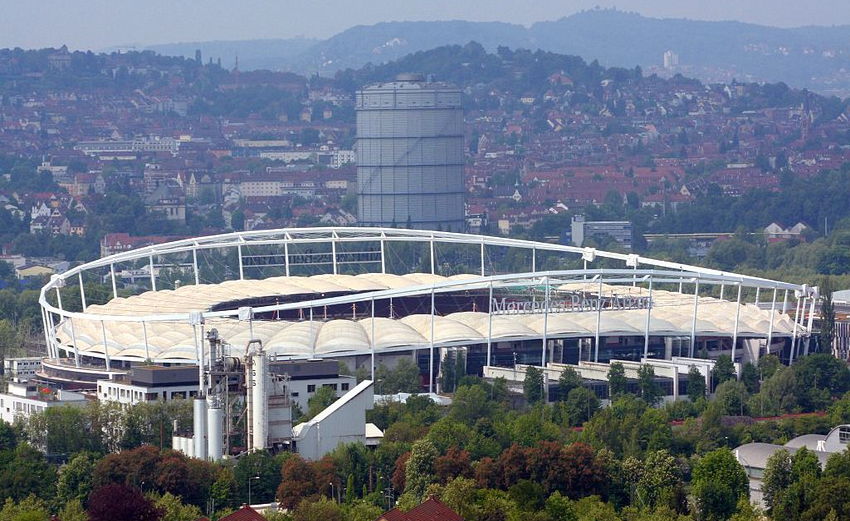
€126.7 million
As you might be realising by now, German football teams are keen on making sponsorship deals for their stadiums in order to reduce the cost of building and operating them. The Mercedes-Benz Arena in Stuttgart opened its doors for the first time in 1933 and has been renovated on numerous occasions since then. Prior to 1993 it was predominantly known as the Neckarstadion, though it has had some less savoury names during its existence. Between its opening and the end of the Second World War, for example, it held the moniker of the Adolf-Hitler-Kampfbahn. Neckarstadion came into use in 1949 and you shouldn’t be overly surprised if it’s also what it’s known as during the Euros, given UEFA’s refusal to allow companies that aren’t one of their official sponsors to have their names plastered around for free during one of their tournaments.
As well as being the home of the German side VfB Stuttgart, the German national side also play games in the venue from time to time. As well as hosting four matches during the World Cup in 1974 and six games during the same competition when it took place in Germany in 2006, the Mercedes-Benz Arena was the location for two games when the European Championships were last hosted on German soil in 1988. They were a first round game and a semi-final, plus it has hosted two European Cup finals, so the city is well versed in having to cope with an influx of large numbers of football fans. Since 2009 the ground has been specifically used for football, having previously been something of a multiple-purpose venue and, as with so many others around the country, its capacity increased when safe standing is allowed.
VOLKSPARKSTADION – Hamburg
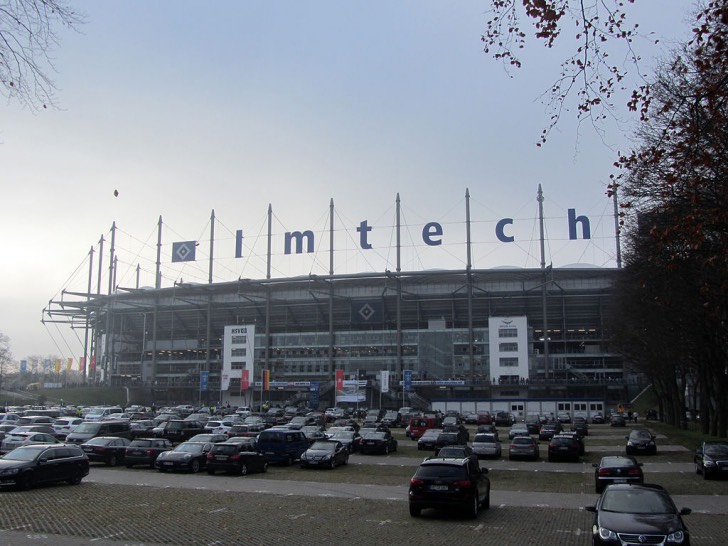
€100 million
Hamburg is a city perhaps best known to English audiences as the place in Germany that The Beatles went to during their more formative years. From a footballing point of view, those who lived through the 1970s and 1980s will remember Hamburger SV well, even if more modern fans wouldn’t think of them as being a German footballing powerhouse. The club had nothing to do with the stadium when it was first built in the 1950s, not moving into it until a decade after it opened. The name translates roughly as ‘The People’s Park Stadium’, which comes from the fact that it’s located in the Altona Volkspark, or ‘People’s Park’.
The ground that exists now is nothing like the one that opened its doors back in 1953, having been completely knocked down and rebuilt in 1998 to assist with Germany’s bid to host the World Cup in 2006. As well as being far more modern and suitable to host big matches than the venue that was originally built, the 1998 renovation included rotating the entire ground ninety degrees in order to take advantage of natural sunlight. It’s a UEFA Elite stadium and has a history of being used for big tournaments. As well as hosting games in both the 1974 and 2006 World Cup and the 1988 Euros, the Volksparkstadion was where the final of 2010 Europa League final between Atlético Madrid and Fulham took place.
Merkur Spiel-Arena – Düsseldorf
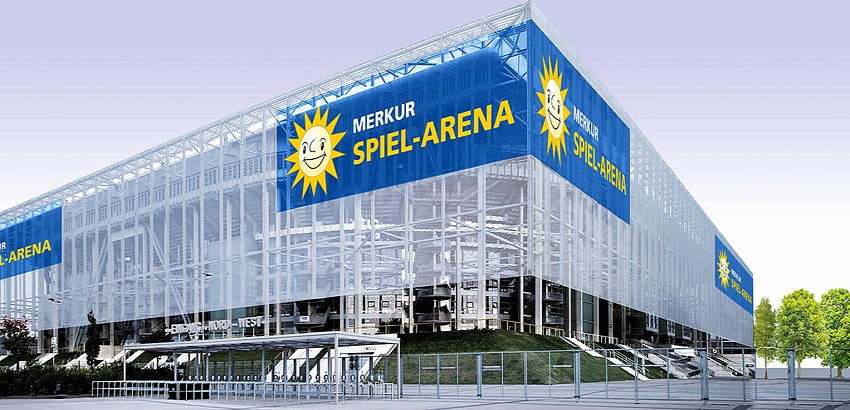
€240 million
Previously known as the Esprit Arena and LTU Arena because of sponsorship deals, the Merkur Spiel-Arena first opened its doors in 2004. It was built on the site of the former Rheinstadion in Düsseldorf and is the home of Fortuna Düsseldorf. Bayer Leverkusen played here for the 2008-2009 season and the German national side also plays some games it every so often. Interestingly, despite being one of the newest grounds in the country at the time, the venue was not used to host matches when Germany was the host nation for the 2006 World Cup. Perhaps even more intriguing is the fact that it has also been used to host matches for the Portugal international team; namely a 3-0 win against Saudi Arabia and a 2-1 defeat to Greece in 2006 and 2008 respectively.
Though it is best-known for its hosting of football matches, the arena has seen numerous different events take place within its walls and therefore knows how to cope with vast numbers of people swarming towards it. For a time it was the home of the NFL Europe side Rhein Fire, for example, resulting in it being the venue for the final of World Bowl XIII and XIV. In 2015 it hosted the boxing match between Wladimir Klitschko and Tyson Fury, which the latter won on a unanimous points decision. It has also been used over the years to host music concerts and the likes of Phil Collins, The Rolling Stones and Bon Jovi have all performed in it. It boasts both a retractable roof and a heating system that ensure it’s comfortable for use in the summer. As with so many other venues in Germany, it has different capacities depending on whether or not supporters are allowed to stand.
MÜNGERSDORFER STADION (RheinEnergieStadion) – Cologne
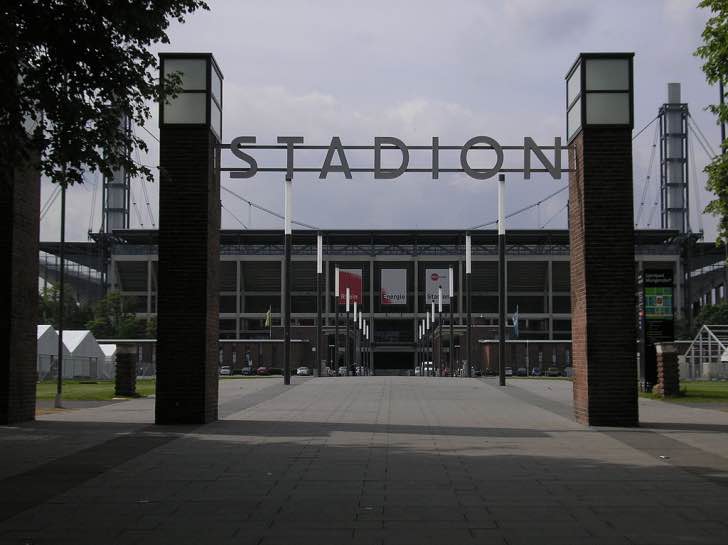
47.4 million DEM
Officially known as the RheinEnergieStadion because of a deal with a local energy supplier, the stadium is built on the site of two previous football grounds that were both known as Müngersdorfer Stadion. Believe it or not, the stadium actually owes its existence in a roundabout kind of way to the Treaty of Versailles, which saw the fortifications that surrounded the city of Cologne removed. That meant that there was then enough room to build a new structure that could be used for entertainment, with the result being the original Müngersdorfer Stadion. Football suddenly became big business in the area and huge crowds went to watch Germany play against the Netherlands in 1927.
In terms of knowing what it takes to host big matches in the most important competitions, the RheinEnergieStadion was used to host games in both the 2005 FIFA Confederations Cup and the World Cup the following year, being one of only five locations to be involved with both tournaments. It’s also the home of the local side 1. FC Köln, accepting thousands of people through its doors on a regular basis during the domestic German football season. The original idea behind the renovation of the ground in the 1970s was to see it become a host venue for the World Cup in 1974, but the cost of renovation kept spiralling and in the end the work couldn’t be completed. As with many other grounds, the capacity depends on whether standing is allowed.
RED BULL ARENA – Leipzig
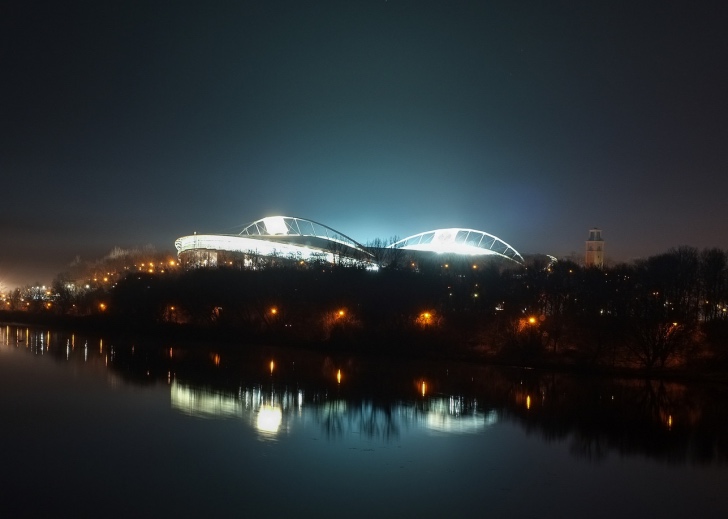
€90 million
Nowhere quite sums up the confusion surrounding sponsorship deals in Germany quite like Red Bull Arena in Leipzig. It’s the home of RB Leipzig, which officially stands for RasenBallsport Leipzig but is shortened to RB because teams themselves are not allowed to bear sponsorship names in German domestic football. The club was only formed in 2009, owned and operated by the soft drink company Red Bull. After they formed the club the drinks maker decided to pump a decent amount of money in the renovations of a stadium that had first opened its doors back in 1956. The result was a brand new stadium being built inside the old stadium between 2000 and 2004.
The newly created venue was used to host matches in both the 2005 FIFA Confederations Cup and the World Cup in 2006, being the only venue from the former East Germany used in the latter competition. When it used for Champions League matches and the like it can revert to its former name of the Zentralstadion, though more often than not it takes on the far simpler moniker of RB Arena. As with many football grounds around the world, Red Bull Arena is often used for music concerts and artists such as Bruce Springsteen, Paul McCartney and Tina Turner have played gigs in it.
Waldstadion (Deutsche Bank Park) – Frankfurt
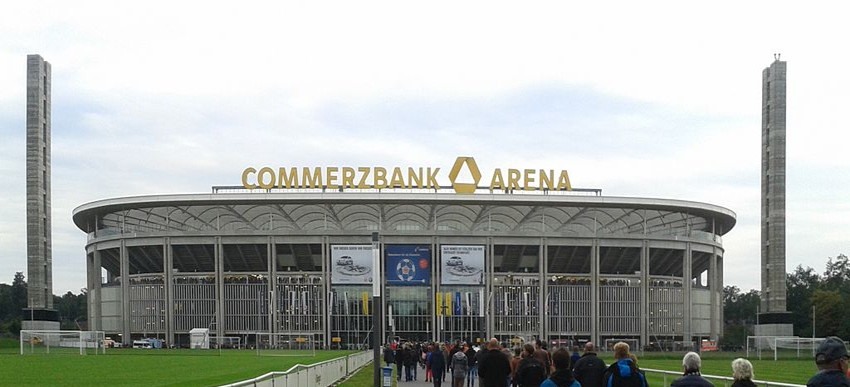
€150 million
Eintracht Frankfurt
The final stadium on the list of host venues for the 2024 edition of the European Championships is the Waldstadion in Frankfurt. The home of Eintracht Frankfurt is occasionally used to host Germany’s international matches, with the national side having no one specific location. It first opened its doors in 1925 and, as with so many other venues around the country, has been renovated so many times over the years as to be virtually unrecognisable from that original ground. Renovations have occurred in 1937, 1953, 1974 and 2005, meaning that the true cost of the ground isn’t really known.
The first renovations occurred after more supporters got into the ground than it was intended to host, leading to two hundred people being injured. More renovations took place ahead of it being used as a host venue for the World Cup in 1974, whilst the ground as it currently is was built in 2005 and then used for the opening match and the final of that year’s Confederations Cup. That was a precursor to the World Cup the following year, so it’s fair to say that the Waldstadion knows what’s involved in the hosting of major tournament matches. It is located within a sports complex in the city of Frankfurt, with venues for the likes of tennis and beach volleyball also being located nearby.
Fixtures
Group A
| Fixture | Date & Time | City/Stadium | ||
|---|---|---|---|---|
 Germany Germany |
v |  Scotland Scotland |
Fri 14th June | Munich Allianz Arena |
 Hungary Hungary |
v |  Switzerland Switzerland |
Sat 15th June | Cologne RheinEnergieStadion |
 Germany Germany |
v |  Hungary Hungary |
Weds 19th June | Stuttgart Mercedes-Benz Arena |
 Scotland Scotland |
v |  Switzerland Switzerland |
Weds 19th June | Cologne RheinEnergieStadion |
 Switzerland Switzerland |
v |  Germany Germany |
Sun 23rd June | Frankfurt Deutsche Bank Park |
 Scotland Scotland |
v |  Hungary Hungary |
Sun 23rd June | Stuttgart Mercedes-Benz Arena |
Group B
| Fixture | Date & Time | City/Stadium | ||
|---|---|---|---|---|
 Spain Spain |
v |  Croatia Croatia |
Sat 15th June | Berlin Olympiastadion |
 Italy Italy |
v |  Albania Albania |
Sat 15th June | Dortmund Signal Iduna Park |
 Croatia Croatia |
v |  Albania Albania |
Weds 19th June | Hamburg Volksparkstadion |
 Spain Spain |
v |  Italy Italy |
Thurs 20th June | Gelsenkirchen Veltins-Arena |
 Albania Albania |
v |  Spain Spain |
Mon 24th June | Düsseldorf Merkur Spiel-Arena |
 Croatia Croatia |
v |  Italy Italy |
Mon 24th June | Leipzig Red Bull Arena |
Group C
| Fixture | Date & Time | City/Stadium | ||
|---|---|---|---|---|
 Slovenia Slovenia |
v |  Denmark Denmark |
Sun 16th June | Stuttgart Mercedes-Benz Arena |
 Serbia Serbia |
v |  England England |
Sun 16th June | Gelsenkirchen Veltins-Arena |
 Slovenia Slovenia |
v |  Serbia Serbia |
Thurs 20th June | Munich Allianz Arena |
 Denmark Denmark |
v |  England England |
Thurs 20th June | Frankfurt Deutsche Bank Park |
 England England |
v |  Slovenia Slovenia |
Tues 25th June | Cologne RheinEnergieStadion |
 Denmark Denmark |
v |  Serbia Serbia |
Tues 25th June | Munich Allianz Arena |
Group D
| Fixture | Date & Time | City/Stadium | ||
|---|---|---|---|---|
 Poland Poland |
v |  Netherlands Netherlands |
Sun 16th June | Hamburg Volksparkstadion |
 Austria Austria |
v |  France France |
Mon 17th June | Düsseldorf Merkur Spiel-Arena |
 Poland Poland |
v |  Austria Austria |
Fri 21st June | Berlin Olympiastadion |
 Netherlands Netherlands |
v |  France France |
Fri 21st June | Leipzig Red Bull Arena |
 Netherlands Netherlands |
v |  Austria Austria |
Tues 25th June | Berlin Olympiastadion |
 France France |
v |  Poland Poland |
Tues 25th June | Dortmund Signal Iduna Park |
Group E
| Fixture | Date & Time | City/Stadium | ||
|---|---|---|---|---|
 Romania Romania |
v |  Ukraine Ukraine |
Mon 17th June | Munich Allianz Arena |
 Belgium Belgium |
v |  Slovakia Slovakia |
Mon 17th June | Frankfurt Deutsche Bank Park |
 Slovakia Slovakia |
v |  Ukraine Ukraine |
Fri 21st June | Düsseldorf Merkur Spiel-Arena |
 Belgium Belgium |
v |  Romania Romania |
Sat 22nd June | Cologne RheinEnergieStadion |
 Slovakia Slovakia |
v |  Romania Romania |
Weds 26th June | Frankfurt Deutsche Bank Park |
 Ukraine Ukraine |
v |  Belgium Belgium |
Weds 26th June | Stuttgart Mercedes-Benz Arena |
Group F
| Fixture | Date & Time | City/Stadium | ||
|---|---|---|---|---|
 Turkey Turkey |
v |  Georgia Georgia |
Tues 18th June | Dortmund Signal Iduna Park |
 Portugal Portugal |
v |  Czech Rep Czech Rep |
Tues 18th June | Leipzig Red Bull Arena |
 Georgia Georgia |
v |  Czech Rep Czech Rep |
Sat 22nd June | Hamburg Volksparkstadion |
 Turkey Turkey |
v |  Portugal Portugal |
Sat 22nd June | Dortmund Signal Iduna Park |
 Georgia Georgia |
v |  Portugal Portugal |
Weds 26th June | Gelsenkirchen Veltins-Arena |
 Czech Rep Czech Rep |
v |  Turkey Turkey |
Weds 26th June | Hamburg Volksparkstadion |
Last 16
| Fixture | Date & Time | City/Stadium | ||
|---|---|---|---|---|
 Switzerland Switzerland |
v |  Italy Italy |
Sat 29th June | Berlin Olympiastadion |
 Germany Germany |
v |  Denmark Denmark |
Sat 29th June | Dortmund Signal Iduna Park |
 England England |
v |  Slovakia Slovakia |
Sun 30th June | Gelsenkirchen Veltins-Arena |
 Spain Spain |
v |  Georgia Georgia |
Sun 30th June | Cologne RheinEnergieStadion |
 France France |
v |  Belgium Belgium |
Mon 1st July | Düsseldorf Merkur Spiel-Arena |
 Portugal Portugal |
v |  Slovenia Slovenia |
Mon 1st July | Frankfurt Deutsche Bank Park |
 Romania Romania |
v |  Netherlands Netherlands |
Tues 2nd July | Munich Allianz Arena |
 Austria Austria |
v |  Turkey Turkey |
Tues 2nd July | Leipzig Red Bull Arena |
Quarter Finals
| Fixture | Date & Time | City/Stadium | ||
|---|---|---|---|---|
 Spain Spain |
v |  Germany Germany |
Fri 5th July | Stuttgart Mercedes-Benz Arena |
 Portugal Portugal |
v |  France France |
Fri 5th July | Hamburg Volksparkstadion |
 England England |
v |  Switzerland Switzerland |
Sat 6th July | Düsseldorf Merkur Spiel-Arena |
 Netherlands Netherlands |
v |  Turkey Turkey |
Sat 6th July | Berlin Olympiastadion |
Semi-Finals
| Fixture | Date & Time | City/Stadium | ||
|---|---|---|---|---|
 Spain Spain |
v |  France France |
Tues 9th July | Munich Allianz Arena |
 Netherlands Netherlands |
v |  England England |
Weds 10th July | Dortmund Signal Iduna Park |
Final
| Fixture | Date & Time | City/Stadium | ||
|---|---|---|---|---|
 Spain Spain |
v |  England England |
Sun 14th July | Berlin Olympiastadion |
